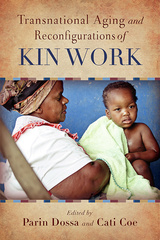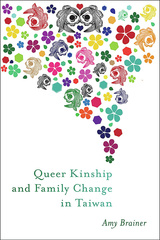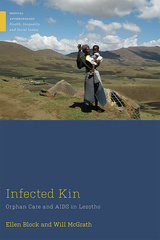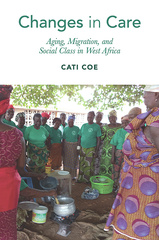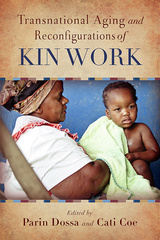Difficult Attachments
Anxieties of Kinship and Care
Rutgers University Press
Anthropologists have long considered kinship as the basis for social solidarity. Indeed, the idea that kinship is grounded in positive sociality has found its way into most anthropological accounts and has served as an orienting framework directing decades of scholarly research. But what about when it is not? What about instances when kinship is anything but ‘warm and fuzzy’ but is characterized, instead, by neglect, violence, negative affect, or a lack of nurturance and care? In the three interlinked sections of this volume, the view that kinship is about “solidarity” and “care” is challenged by exploring how kin relations are not only about connection and inclusion but also about disconnection, exclusion, neglect, and violence. Kinship relationships that feel “positive” and “good” take a great deal of perseverance and work; there is nothing “natural” about kinship ties as being based on positive sociality. In these chapters, the contributors take seriously the contingency of kinship relations (the moments when kinship breaks down or is a source of suffering) and how this prompts scholars to develop new theoretical and methodological perspectives.
Difficult Attachments brilliantly theorizes the necessity for kinship studies to move beyond cultural and theoretical ideals about kinship to encompass kinship’s everyday realities. In the space of this expanded vision, this groundbreaking volume offers rich accounts of the complexities of lived experiences of kinship: the contingencies as much as the unconditional solidarity, the violence and conflict as much as the love and nurturance, and the hierarchies of power as much as the mutuality of being.
This arresting and highly welcome collection provides a long-overdue, sustained scrutiny of the so-called 'negative' aspects of kinship. Envy, disappointments, dislike, disconnection—as well as more extreme manifestations documented here—are, the authors argue, constitutive of kinship rather than its negation. Decentring kinship ideals from its definition and analysis, these rich and provocative essays demonstrate the productivity of writing against the grain, and chart new pathways for kinship studies.
KATHRYN E. GOLDFARB is an assistant professor of anthropology at the University of Colorado Boulder.
SANDRA BAMFORD is an associate professor and chair of anthropology at the University of Toronto Scarborough. She is the editor of The Cambridge Handbook of Kinship, coeditor of Beyond Kinship: The Genealogical Model Reconsidered, and the author of Biology Unmoored: Melanesian Reflections on Life and Biotechnology.
MARILYN STRATHERN is a professor emeritus of social anthropology at Cambridge University and Hon. Life President of the UK Association of Social Anthropologists (ASA). She is the author of Relations: An Anthropological Account and Kinship, Law, and the Unexpected: Relatives Are Always a Surprise.
SANDRA BAMFORD is an associate professor and chair of anthropology at the University of Toronto Scarborough. She is the editor of The Cambridge Handbook of Kinship, coeditor of Beyond Kinship: The Genealogical Model Reconsidered, and the author of Biology Unmoored: Melanesian Reflections on Life and Biotechnology.
MARILYN STRATHERN is a professor emeritus of social anthropology at Cambridge University and Hon. Life President of the UK Association of Social Anthropologists (ASA). She is the author of Relations: An Anthropological Account and Kinship, Law, and the Unexpected: Relatives Are Always a Surprise.
Introduction: Ambivalent Affinities: Kinship Beyond Mutuality by Kathryn E. Goldfarb and Sandra Bamford
Part I: Ambiguities of Care
Chapter 1: The Estranged Case of Leonard: Aging with Dementia when Kin Don’t Care by Janelle S. Taylor
Chapter 2: Kinship in the Carceral: Aging and Aspiration in Tokyo by Jason Danely
Chapter 3: When Choosing Doesn’t Stick: Limits of Queer Kinship and Community in Old Age by Celeste Pang
Chapter 4: When Forever Doesn’t Last a Lifetime: Adoption Disruption and the State in North America by Sandra Bamford
Chapter 5: Emergency Rooms: A Story about Motherhood, Medicine, Reluctance, Mystery, and Expertise by Danilyn Rutherford
Part II: Toxic States
Chapter 6: Siblings and the Darker Sides of a (Finally) Realized “Mutuality of Being” by Noa Vaisman
Chapter 7: Reunification as Refusal: Kin-Making and Unmaking in the Aftermath of Indigenous Child Removal by Erika Finestone
Chapter 8: Kinship under Colonial Duress: Anti-Colonial Nationalism Mends Ruptured Tibetan Attachments by Dawa Lokyitsang
Chapter 9: Schools as Kin: Shifts in Black Strategic (Teacher) Mothering in the “School Choice Marketplace” by Riché J. Daniel Barnes
Chapter 10: Estranged: U.S. Immigration Detention and the Erasure of Family Ties by Deborah A. Boehm
Part III: Negative Affects
Chapter 11: Strange and Burdensome Gifts: Giving and Receiving in Families Shaped by Hoarding by Katie Kilroy-Marac
Chapter 12: Not Family Care: Welcoming the Wild Things in Japanese Child Welfare by Kathryn E. Goldfarb
Chapter 13: “Looking Back” at the Mirror: Reflections of and on Messy Dog Siblingship by Patrick McKenzie
Chapter 14: Diffuse and Enduring Disappointment: Thinking Kinship in South Africa and Beyond by Brady G’Sell
Chapter 15: Adjustment Problems: Ambivalence and Moral Imagination in North Indian Kinship by Julia Kowalski
Chapter 16: When an Affect Becomes an Epidemic: Exploring Loneliness and Relatedness in the 21st Century by Sonia Zhang
Chapter 17: Kinship Conceived and Lived by Michael Lambek
Afterword: A Language for Kinship by Marilyn Strathern
Part I: Ambiguities of Care
Chapter 1: The Estranged Case of Leonard: Aging with Dementia when Kin Don’t Care by Janelle S. Taylor
Chapter 2: Kinship in the Carceral: Aging and Aspiration in Tokyo by Jason Danely
Chapter 3: When Choosing Doesn’t Stick: Limits of Queer Kinship and Community in Old Age by Celeste Pang
Chapter 4: When Forever Doesn’t Last a Lifetime: Adoption Disruption and the State in North America by Sandra Bamford
Chapter 5: Emergency Rooms: A Story about Motherhood, Medicine, Reluctance, Mystery, and Expertise by Danilyn Rutherford
Part II: Toxic States
Chapter 6: Siblings and the Darker Sides of a (Finally) Realized “Mutuality of Being” by Noa Vaisman
Chapter 7: Reunification as Refusal: Kin-Making and Unmaking in the Aftermath of Indigenous Child Removal by Erika Finestone
Chapter 8: Kinship under Colonial Duress: Anti-Colonial Nationalism Mends Ruptured Tibetan Attachments by Dawa Lokyitsang
Chapter 9: Schools as Kin: Shifts in Black Strategic (Teacher) Mothering in the “School Choice Marketplace” by Riché J. Daniel Barnes
Chapter 10: Estranged: U.S. Immigration Detention and the Erasure of Family Ties by Deborah A. Boehm
Part III: Negative Affects
Chapter 11: Strange and Burdensome Gifts: Giving and Receiving in Families Shaped by Hoarding by Katie Kilroy-Marac
Chapter 12: Not Family Care: Welcoming the Wild Things in Japanese Child Welfare by Kathryn E. Goldfarb
Chapter 13: “Looking Back” at the Mirror: Reflections of and on Messy Dog Siblingship by Patrick McKenzie
Chapter 14: Diffuse and Enduring Disappointment: Thinking Kinship in South Africa and Beyond by Brady G’Sell
Chapter 15: Adjustment Problems: Ambivalence and Moral Imagination in North Indian Kinship by Julia Kowalski
Chapter 16: When an Affect Becomes an Epidemic: Exploring Loneliness and Relatedness in the 21st Century by Sonia Zhang
Chapter 17: Kinship Conceived and Lived by Michael Lambek
Afterword: A Language for Kinship by Marilyn Strathern




